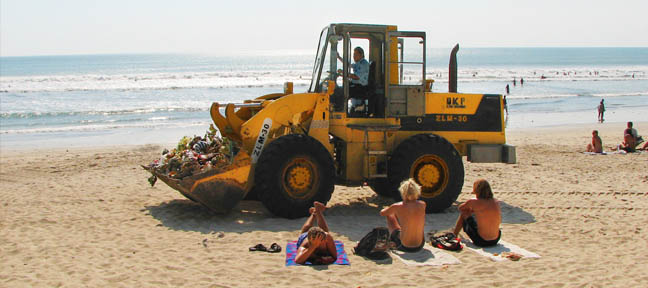
Article in PDF (Download)
Are NGOs the conscience of humanity? – Mark Ulyseas
The former UN Secretary General Kofi Annan had said that NGOs are the conscience of humanity. Unfortunately not all NGOs have a conscience and this is where genuine NGOs are getting affected by the negative fallout of the ‘doubtful actions’ committed by some of their ilk.
The unseemly revelation that an employee of Greenpeace lost €3.8 million on speculation in the currency markets leaves a bad taste in the mouth especially for the small donors who constitute 90% of its funding. With a €200 million yearly budget, Greenpeace is a corporation like the corporations it is fighting against! So is Greenpeace an investment company or an NGO fighting for conservation? And should NGOs be involved in such activities like currency speculation etc. when donations are made by well-meaning people for a particular purpose like saving the blue fin tuna, whales or banning of shark finning?
If donations are raised under the banner of a specific cause then that money must go for that cause and should not be diverted for other purposes. And if the diversion of funds occurs then this is an act of obtaining funds under falsehood, which amounts to cheating the donors. This incident opens up a can of worms – who monitors the methods, functioning and financial activities of an NGO? Is an NGO above and beyond the law of the land?
It is a known fact that a number of NGOs are instruments of government policy. They monitor situations in foreign countries, collect and collate data and further pass this onto their government. And for this they get ‘financial support’ and other fringe benefits. Here is an interesting excerpt from www.ngo-monitor.org on Amnesty International that exposes its duplicity:
In its Statute, Amnesty International fosters an image that “impartiality and independence” are core tenets of its agenda. Amnesty presents itself as unbiased, and independent of governments and their interests, and its statements are widely accepted because the media and diplomats consider the NGO as upholding the universal principles of human rights. This image, however, is misleading. Contrary to what the NGO implies on its website and in other PR materials, Amnesty International and its local branches do in fact accept government funding. Likewise, Amnesty claims that it maintains a policy of “impartiality” and is unbiased in its research of allegations of human rights violations. Despite this claim, Amnesty employs an anti-Israel activist as a researcher in its “Israel, Occupied Palestinian Territories and Palestinian Authority” section. This individual, Deborah Hyams, has a well-documented history of radical activism in the context of the Arab-Israeli conflict, and, correspondingly, weakens Amnesty’s credibility and claims of neutrality. Since 2010, when it dismissed women’s rights advocate Gita Saghal for blowing the whistle on Amnesty’s association with an alleged Taliban supporter, Amnesty’s international credibility has been greatly damaged. As shown in this report, the façade of Amnesty’s impartiality is far more extensive. LINK
From ‘corporate’ NGOs we now turn to the briefcase variety that use donations to first pay their own wages and then utilise the remaining funds for the ‘cause’. The ‘cause’ becomes a USP for garnering donations and employing the promoters. In short, it is becoming a business.
One is not attempting to malign all NGOs but merely to point out the fallibility of the system, which is prone to abuse and corruption. The work that an NGO does is always for a noble cause that does not distinguish between race, colour and creed. Its financials are open to scrutiny and funding is strictly from non-governmental sources so as to retain an ethical standard of impartiality. This is supposed to be the ‘ideal’ situation. But the ground realities are quite different as evident in this brief over view:
NGOs increasingly work “in the field,” providing humanitarian relief and development assistance in countries around the world. As they carry out their work, they face many serious problems. Governments or rebel groups deny them access to those in need, corrupt officials or warlords demand payoffs, and local violence threatens the safety and even the lives of field personnel. Donors also subject these NGOs to political pressure, diminishing their neutrality. Military forces increasingly distribute humanitarian assistance to civilians in countries they occupy, blurring the traditional military/humanitarian distinction and making civilian humanitarian workers targets for resistance fighters. In the 1990s, a problematic new doctrine of “humanitarian intervention” arose, giving a humanitarian rationale for armed conflict. Some NGOs have uncritically embraced this doctrine, which further erodes humanitarian neutrality and blurs the longtime distinction between humanitarian action and the anti–humanitarian nature of warfare and organized violence, as carried out by the most powerful states. LINK
The former UN Secretary General Kofi Annan had said that NGOs are the conscience of humanity. Unfortunately not all NGOs have a conscience and this is where genuine NGOs are getting affected by the negative fallout of the ‘doubtful actions’ committed by some of their ilk.
Om Shanti Shanti Shanti Om
01 June 2014
© Mark Ulyseas

